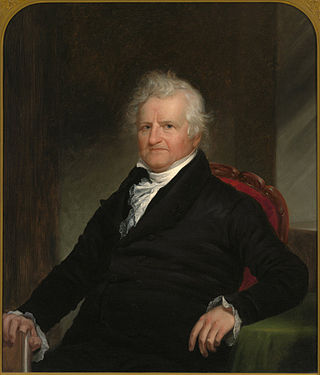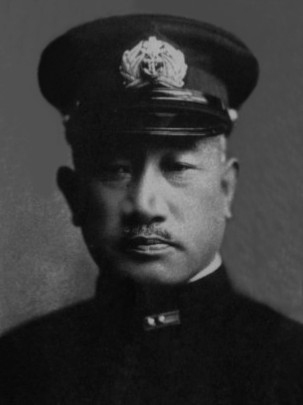Related Research Articles

Samuel Eliot Morison was an American historian noted for his works of maritime history and American history that were both authoritative and popular. He received his Ph.D. from Harvard University in 1912, and taught history at the university for 40 years. He won Pulitzer Prizes for Admiral of the Ocean Sea (1942), a biography of Christopher Columbus, and John Paul Jones: A Sailor's Biography (1959). In 1942, he was commissioned to write a history of United States naval operations in World War II, which was published in 15 volumes between 1947 and 1962. Morison wrote the popular Oxford History of the American People (1965), and co-authored the classic textbook The Growth of the American Republic (1930) with Henry Steele Commager.

Joseph Bradley Varnum was an American politician from Massachusetts. He served as a U.S. representative and United States senator, and held leadership positions in both bodies. He was a member of the Democratic-Republican Party.

William Franklin Knox was an American politician, soldier, newspaper editor, and publisher. He was the Republican vice presidential candidate in 1936 and Secretary of the Navy under Franklin D. Roosevelt during most of World War II. On December 7, 1941, Knox, flanked by his assistant John O’Keefe, walked into Roosevelt's White House study around 1:30 pm EST, and announced that Japan had attacked Pearl Harbor.

William Putnam Bundy was an American attorney and analyst with the CIA. Bundy served as a foreign affairs advisor to both presidents John F. Kennedy and Lyndon B. Johnson. He had key roles in planning the Vietnam War, serving as deputy to Paul Nitze at Defense under Kennedy and as Assistant Secretary of State for East Asian and Pacific affairs under Johnson.

John Lester Hubbard Chafee was an American politician and officer in the United States Marine Corps. A member of the Republican Party, he served as the 66th Governor of Rhode Island, as the Secretary of the Navy, and as a United States Senator.
Henry Poor may refer to:

William Leonard Langer was an American historian, intelligence analyst and policy advisor. He served as chairman of the history department at Harvard University. He was on leave during World War II as head of the Research and Analysis Branch of the Office of Strategic Services. He was a specialist on the diplomacy of the periods 1840–1900 and World War II. He edited many books, including a series on European history, a large-scale reference book, and a university textbook.
Desmond FitzGerald was an American intelligence officer for the Central Intelligence Agency (CIA), where he rose to the position of Deputy Director of Plans. He served in the CIA from 1950 until his death. Posthumously he was awarded the National Security Medal. An attorney, he had worked in New York City both before and after World War II. During the war, he was an Army officer, serving as liaison and adviser to the Chinese Army.

Henry Varnum Poor was an American financial analyst and founder of H.V. and H.W. Poor Co, which later evolved into the financial research and analysis bellwether, Standard & Poor's.

Aritomo Gotō was an admiral in the Imperial Japanese Navy during World War II.

Kakuji Kakuta, was an admiral in the Imperial Japanese Navy during World War II. He is noted for his role in commanding Japanese naval aviation units in the Pacific War.
Takatsugu Jōjima was an admiral in the Imperial Japanese Navy during World War II.
Charles Tracy Barnes was a senior staff member at the United States' Central Intelligence Agency (CIA), serving as principal manager of CIA operations in the 1954 Guatemalan coup d'état and the 1961 Bay of Pigs Invasion.

John Francis Manning is an American legal scholar who serves as the 13th Dean of Harvard Law School. On March 14, 2024, Manning was appointed as the interim provost of Harvard University, and is on a leave of absence from his deanship. He was previously the Bruce Bromley Professor of Law at Harvard Law School (HLS), where he is a scholar of administrative and constitutional law.
Francis Hardon Burr was an American football player. He was a first-team All-American guard in 1906 and captain of the 1908 Harvard Crimson football team. After he died of typhoid fever in 1910, the Francis H. Burr Award was established in his honor.

Rufus Lackland Taylor Jr. was an officer in the United States Navy. Eventually he became Director of the Office of Naval Intelligence and held the rank of Vice Admiral. In 1966 he was appointed as Deputy Director of the Defense Intelligence Agency (DIA), then shortly thereafter as Deputy Director of the CIA, where he served from 1966 to 1969.
David Henry Blee served in the Central Intelligence Agency (CIA) from its founding in 1947 until his 1985 retirement. During World War II in the Office of Strategic Services (OSS), he had worked in Southeast Asia. In the CIA, he served as Chief of Station (COS) in Asia and Africa, starting in the 1950s. He then led the CIA's Near East Division.
The Lauder Greenway family is a Scottish-American family whose influence on, and involvement in, American political and economic affairs dates from the 1640s through the contemporary era. Their primary contributions have been in the sciences, government, and intelligence. The most notable members are George Lauder and his "cousin-brother" Andrew Carnegie. They co-created the Carnegie Steel Corporation, the forerunner to U.S. Steel, and subsequently became two of the richest men in the world.
The Charles and Julia Henry Fellowships were initiated in 1930. The fellowship funds four full-time post-graduate students every year at Harvard University, Yale University, the University of Cambridge and the University of Oxford. Two students from any British university are funded to study in the US, and two American students from Harvard and Yale are funded to study at Cambridge and Oxford.
James Mitchell Varnum was an American lawyer and politician from New York.
References
- 1 2 3 4 5 6 7 8 9 "Henry Varnum Poor, Lawyer And Former Yale Dean, Dies". New York Times . October 11, 1972. Retrieved 2015-09-18.
- 1 2 "Henry V. Poor Will Marry Miss Elizabeth C. Durham", The Brooklyn Daily Eagle, November 3, 1936
- 1 2 3 4 White, James Terry (1977), "Poor, Henry Varnum", The National Cyclopaedia of American Biography, vol. 57, p. 425
- ↑ "Advocate and Critic Merge into One Literary-Critical Magazine", The Harvard Crimson , December 4, 1934
- ↑ "Stanton Deland Named to Conference Group", The Harvard Crimson , January 22, 1936
- ↑ Press releases of the United States Department of State, U.S. Government Printing Office, 1938, p. 284,
Henry V. Poor, of New York, N.Y., who has been serving as vice consul at Montreal, Quebec, Canada, has been assigned to the Department of State for the Foreign Service Officers' Training School beginning March 15, 1938
- 1 2 "Henry Poor, Former CIA Aide, Dies" (PDF). San Francisco Chronicle . October 12, 1972.
- ↑ "Foreword to the NHC Edition". The Battle of Cape Esperance and the Battle of the Santa Cruz Islands. Naval Historical Center.
- ↑ "Declaration by 'Republican Advance' Group Endorsed by 21 House Members", Toledo Blade, July 4, 1950
- ↑ Sosin, Gene (2010). Sparks of Liberty: An Insider's Memoir of Radio Liberty. Penn State Press. p. 275. ISBN 9780271038636.